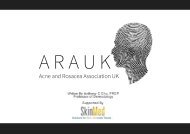Acne and Rosacea Charity Training Manual
Create successful ePaper yourself
Turn your PDF publications into a flip-book with our unique Google optimized e-Paper software.
Oral Isotretinoin<br />
Oral isotretinoin is used to treat Type 2 rosacea which has failed to respond to conventional antibiotics. It does seem to work but rapid relapses when the drug is<br />
withdrawn is the norm. Indeed, in my experience oral isotretinoin seems to precipitate rosacea in susceptible patients who are being treated for acne <strong>and</strong> I have a<br />
number of patients whose rosacea started when they took oral isotretinoin.<br />
Laser treatment<br />
As in acne, the bio-stimulatory effect of the NLite (Regenlite) laser, used at low fluencies – 2.5-3.5J/cm 2 can be very effective in inflammatory rosacea. Treatments need<br />
to be repeated every 3 months.<br />
Treatment of type III rosacea<br />
Phytomatous change in the skin will not respond to medical treatment. Oral isotretinoin (1mg/kg/day) will reduce the swelling but it relapses when the drug is<br />
withdrawn.<br />
It is important to treat the active rosacea so that the disease does not progress, but the only effective treatments are surgical, debulking changes on the cheeks,<br />
forehead <strong>and</strong> chin. The nose can be carved back to its original shape <strong>and</strong> size.<br />
Treatment of Type IV rosacea<br />
There seems to be poor correlation between severity of rosacea or response to treatment of Type I <strong>and</strong> Type II rosacea <strong>and</strong> the severity of ocular rosacea. Always ask<br />
patients with rosacea if they have any ocular problems. Some patients will respond to oral doxycycline but I generally refer patients to the ophthalmologist for<br />
treatments which will often involve eye toilet <strong>and</strong> use of artificial tears.



